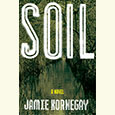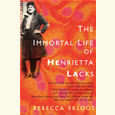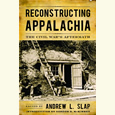Not Quite a New Day
Three recent poetry collections seek form and language to reflect an uncertain world
Blas Falconer’s Rara Avis
In a memorable poem from Blas Falconer’s lean, graceful collection, Rara Avis, the speaker describes a simple action: blowing soap bubbles. But Falconer observes this small moment with such clear, spare attentiveness that we grow spellbound to its quiet space of resonant meaning.
 This poem, titled “For a Spell,” evokes a temporary mesmerism that takes over as “the iridescent film // within the serrated ring / trembles as it grows and grows.” The spell cast — by the soap bubble, by the poem — exerts its ephemeral magic “until // you are — we are — in it, / all that has ever or will ever waits outside the bubble, which floats, now, / slowly to the ground.”
This poem, titled “For a Spell,” evokes a temporary mesmerism that takes over as “the iridescent film // within the serrated ring / trembles as it grows and grows.” The spell cast — by the soap bubble, by the poem — exerts its ephemeral magic “until // you are — we are — in it, / all that has ever or will ever waits outside the bubble, which floats, now, / slowly to the ground.”
Rava Avis hums with charged, tenuous spaces. Falconer, who previously served on the faculty of Clarksville’s Austin Peay State University, writes with tender maturity about painful ruptures in loving partnerships, small but powerful moments of revelation found in the routines of fatherhood, and the fearful reckoning of his own father’s incurable illness. Sometimes, he describes these subjects at a hushed distance. But compassion always permeates Falconer’s restraint.
The speaker of “Like a Prize, Like a Black Pearl” lies awake, uneasy on the eve of his father’s major surgery and listening as, in the next room, his best friend weeps for an unknown reason. The poem opens a nighttime threshold space in which all assumptions have vanished: “There was a time when I thought I could bear // anything. Now, the phone rings, and —.” At any moment, Falconer shows us, life can rupture. We ourselves can seem to fracture into shards of memory, heightened observance, and surprising emotions.
The book’s brief final poem trains its focus on a single image: a hummingbird darting into view. “A blur in the periphery, / like the mind if the mind / were airborne.” The image is a fitting grace note, as Falconer’s poems buzz with a hummingbird’s quick alertness. Tremulous and light, even in its darkest subject matter, Rara Avis’s thrumming intelligence and beauty continue to resonate in our minds after we leave its pages.
Rara Avis
By Blas Falconer
Four Way Books
77 pages
$17.95
Danielle Chapman’s Boxed Juice
Danielle Chapman brings vigor and elegance to even the most mundane domestic details in her new collection, Boxed Juice. Whether she’s describing the perils wrought by her husband’s life-threatening illness or the contours of everyday moments, the precision of her language and perspective startles us awake, undoing any assumption we may have about where each poem is heading.
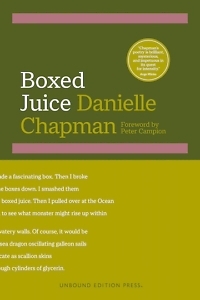 Chapman’s poems juxtapose the absurdity of continuing our daily routines while we must also confront our lives’ toughest obstacles and the fears they provoke. At times, Chapman acknowledges the cost of this struggle: “There is a spirit in me that admits no weakness. / When it sings, the rest of me despairs.” But underneath the darkest currents of fear in Chapman’s work lies a foundational choice to cultivate joy and faith, no matter the difficulty.
Chapman’s poems juxtapose the absurdity of continuing our daily routines while we must also confront our lives’ toughest obstacles and the fears they provoke. At times, Chapman acknowledges the cost of this struggle: “There is a spirit in me that admits no weakness. / When it sings, the rest of me despairs.” But underneath the darkest currents of fear in Chapman’s work lies a foundational choice to cultivate joy and faith, no matter the difficulty.
“There is a discipline, a sport to hope:,” Chapman writes, “to pray for prayers that break the surface whether // you’re better or (please Jesus never) / worse.”
At the center of the book, Chapman places a lyric essay, “Anyway in Spring.” This long piece details her ongoing experience of her husband’s cancer, spanning over a decade. Chapman describes their determination to build a hopeful family life, even while negotiating an endless corridor of blood tests, recurrences, and treatments. At each turn, they seem to marvel — at his survival, at the odd ways people speak or behave in the orbit of a cancer patient, at the fortifying beauty of the natural world.
In her 2023 memoir, Holler, Chapman wrote with stark honesty and deep compassion about her family background in Fairfield, Tennessee. Several poems in Boxed Juice bear a Fairfield, TN, location stamp, bringing this rural setting into a collection that spans from seasonal shifts in New England to the architectural calling-card locations of Manhattan to a grungy, ominous high-rise in Alphabet City to puzzling travel conditions in the Netherlands.
Throughout Boxed Juice, Chapman fights for purpose, faith, and delight within a vision of everyday life that fully recognizes uncertainty as our baseline condition. “The New Nice,” for example, is a crisp summation of the fraught social boundaries we learned to enforce during the COVID pandemic’s most confined era. Other poems recall figures from literary history — poet Jane Kenyon, Argentine writer Jorge Luis Borges — who have offered their own visions for enduring an unknowable world.
Whether writing, caregiving, traveling, or praying, Chapman grounds her poems in the relief that comes from not grasping for certainty, as when “the clear fall air of our own town … blew through the space where facts had been / with a lucidity that refused to drown them. / As if to finish knowing were also to be known.”
Boxed Juice
By Danielle Chapman
Unbound Edition Press
112 pages
$25
Todd Osborne’s Gatherer
Tensions between leaving home and returning recur throughout Todd Osborne’s accomplished debut collection, Gatherer. These tensions create a sense of dislocation and intense longing for an internal orientation via memory and language.
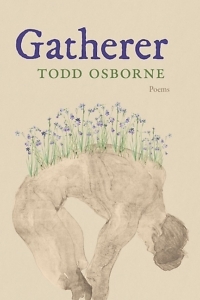 A Nashville native who now lives in Hattiesburg, Mississippi, Osborne explores the complexities of Southern identity in poems like “Moving Day,” written in an unusual form of repeated but reshuffled lines called a Markov sonnet. This poem creates a circuitous, twisting confrontation with origin and identity, an elusive desire for greater belonging with each move — leaving the South, returning to it.
A Nashville native who now lives in Hattiesburg, Mississippi, Osborne explores the complexities of Southern identity in poems like “Moving Day,” written in an unusual form of repeated but reshuffled lines called a Markov sonnet. This poem creates a circuitous, twisting confrontation with origin and identity, an elusive desire for greater belonging with each move — leaving the South, returning to it.
Another Markov sonnet, “State Flag,” invokes the perilous process of Mississippi removing Confederate symbols from its state flag: “A spot of green. Among a horizon of red, / the people keep marching forward, / the sun at their backs. Not quite a new day.” The poem’s form and insights reflect the disjointed pace of progress breaking through entrenched systems of repression, highlighting the reality that the fight for liberation is ongoing and nonlinear, sometimes Sisyphean.
“Promise Dart” is a long poem written in a form that echoes a Pecha Kucha presentation, a visual storytelling form consisting of 20 slides projected for 20 seconds each. Structured around 20 works by artist Damien Hirst, “Promise Dart” explores the loss of a grandfather — first to Alzheimer’s, then to death. Each short section of the poem gives another glimpse of the grandfather’s slow decline, “before the circle of his mind became a curved line, before / the trap door in his head opened, plunged him into another room / with no window or doors.”
Profound uncertainty about the world abounds in Gatherer: a slide into Alzheimer’s oblivion, a wedding arranged amid pandemic conditions, a return to teaching under questionable safety measures, a beloved cat falling ill.
Wrestling with formal structure takes an overt role in the message and vision of these poems, becoming a self-conscious subject of them. “First, Second, Third Person” merges the search for literary form with the search for truth and newness of expression in daily life and identity. “Landscape with a Calm” overlays its bucolic setting with an inquiry into the language we use for such places.
But in the merging of our physical lives and the lives we live on the page, Osborne suggests, lies a potent opportunity for deeper purpose and fulfillment.
“I run through a forest / that is also a library,” Osborne writes, summoning the perspective of a fox. “I read every leaf on each tree. // They tell me their stories so slowly I forget them by the time I finish reading.” The fox absorbs the life of the forest as he runs until there is “nothing standing between the world I know and the world that exists.”
Gatherer
By Todd Osborne
Belle Pointe Press
94 pages
$15.95

Emily Choate is the fiction editor of Peauxdunque Review and holds an M.F.A. from Sarah Lawrence College. Her fiction and essays have appeared in Mississippi Review, storySouth, Shenandoah, The Florida Review, Rappahannock Review, Atticus Review, Tupelo Quarterly, and elsewhere. She lives near Nashville, where she’s working on a novel.
